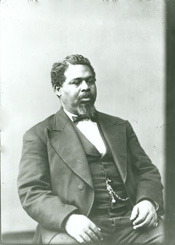Smalls abhorred slavery and desired to be free. He was a “trusted” slave and had obtained a position on the Planter as a wheelman. He used his status to flee from slavery by impersonating the captain of the Planter and sailing the steamer out of Charleston harbor, through St. Helena Sound and by the inland passage down the Beaufort River. He hoisted the white flag of surrender and was taken in by Union vessels. Aboard the ship were eight men and five women including his wife, Lydia, and their three children. For this daring exploit, Robert Smalls later was promoted to the rank of Captain in the US Navy.
During the remainder of the Civil War, he worked with the Port Royal Experiment as a recruiter of African American troops from the sea islands to serve in the Union Army. During the Reconstruction Era, Captain Smalls became a respected South Carolina politician. He was elected to five terms in the United States Congress beginning with the 44th Congress. This Congress was historic in that seven of the congressmen and one of the senators were African-American. These congressmen were from many different professions such as a barber, minister, tailor, US Navy captain.
At the time of his final congressional term, which convened in 1885, only two African Americans remained in Congress. They were Smalls and James E. O’Hara of North Carolina. Throughout his congressional career, the Honorable Robert Smalls introduced legislation to protect the rights of children. He died on February 23, 1915 and is buried in his native Beaufort. Robert Smalls’ house is listed on the National Register of Historic Places.



